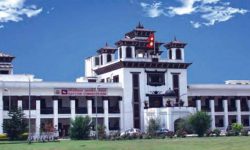Government administering anti-elephantiasis drugs to people in 12 districts

Kathmandu: The government is administering medicines to people in 12 districts of the country from today for treatment of lymphatic filariasis, commonly known as elephantiasis. Lymphatic filariasis is a neglected tropical disease. Infection occurs when filarial parasites are transmitted to humans through mosquitoes.
Infection is usually acquired in childhood causing hidden damage to the lymphatic system. It impairs the lymphatic system and can lead to the abnormal enlargement of body parts, causing pain, severe disability and social stigma. Although mass drug administration is carried out to prevent and control this disease every year, it has not yet come under control.
The campaign has not become much effective as people refuse to take the medicine due to the misconception that it causes side effects. The Ministry of Health and Population is administering the DEC (diethylcarbamazine citrate) and deworming tablets (albendazole) tablets in the 12 high-risk districts of the country from today.
Director of the Department of Health Services, Epidemiology and Disease Control Division, Dr Krishna Prasad Poudel said the drugs are being administered to seven million 45 thousand people of 129 local units in Jhapa, Morang, Dhankuta, Bara, Lamjung, Parbat, Baglung, Kapilbastu, dang, Banke, Bardiya and Kailali districts are being fed the drugs. These districts have been identified as high risk districts.
According to him, 5,400 health workers and 9,500 female health volunteers have been mobilised for the mass drug administration campaign. The health workers will reach the doorsteps of the people and administer drugs for ten days. Dr Poudel urged one and all to take the drugs without any hesitation.
Nepal has been administering these drugs since 2009 for prevention and control of elephantiasis. Elephantiasis is a non-curable diseases and the prevention is the best way to remain safe from it. Swelling of body parts, and legs are the most commonly affected part, tissue/skin thickening, scrotal swelling and vast enlargement of the affected area when elephantiasis develops into chronic conditions.
The skin of the affected areas usually becomes dry and ulcerated, pitted and darkened when it becomes severe. The World Health Organisation (WHO) and Nepal aim to eradicate the disease through mass administration of drugs by 2030. According to Division director Dr Poudel, the country sets the target of operating the regular drug administration campaign against the diseases annually for six years and preventing the transmission.
The anti-filariasis drugs are not recommended for children below two, pregnant, new mothers (up to seven days) and severely ill people. Some may feel dizziness, fever and vomiting after the drugs intake for some days. The estimated number of filariasis patients is around 30,000 in the country. Sharad Sharma/RSS

















 एकीकृत सुरक्षा योजनाअनुसार निर्वाचन सुरक्षा व्यवस्थापन गर्दै सेना
एकीकृत सुरक्षा योजनाअनुसार निर्वाचन सुरक्षा व्यवस्थापन गर्दै सेना निर्वाचनका दिन गाडी चलाउन अनुमति लिनुपर्ने
निर्वाचनका दिन गाडी चलाउन अनुमति लिनुपर्ने HoR elections: 186,000 temporary voters to cast vote for PR system
HoR elections: 186,000 temporary voters to cast vote for PR system सामसङको ‘ह्यान्ड रेजर’ प्रि–रिजर्भ अफर घोषणा
सामसङको ‘ह्यान्ड रेजर’ प्रि–रिजर्भ अफर घोषणा पोखरादेखि ३४ यात्रु लिएर बेलुका ७ बजे छुटेको थियो धादिङमा दुर्घटनामा परेको बस
पोखरादेखि ३४ यात्रु लिएर बेलुका ७ बजे छुटेको थियो धादिङमा दुर्घटनामा परेको बस सशस्त्र प्रहरीका २३ बरिष्ठ उपरीक्षकहरु निर्वाचन अनुगमनमा
सशस्त्र प्रहरीका २३ बरिष्ठ उपरीक्षकहरु निर्वाचन अनुगमनमा लिचीबारी घुस प्रकरणमा रन्जिता श्रेष्ठलाई धरौटीमा छाड्न आदेश
लिचीबारी घुस प्रकरणमा रन्जिता श्रेष्ठलाई धरौटीमा छाड्न आदेश निर्वाचन आयाेगले भन्याे– निर्वाचन चिह्नको भौतिक स्वरूप प्रयोग नगर्नु/नगराउनू
निर्वाचन आयाेगले भन्याे– निर्वाचन चिह्नको भौतिक स्वरूप प्रयोग नगर्नु/नगराउनू Nepal’s Cooperatives at Risk: Legal Concerns over RSP’s Policy
Nepal’s Cooperatives at Risk: Legal Concerns over RSP’s Policy
प्रतिक्रिया